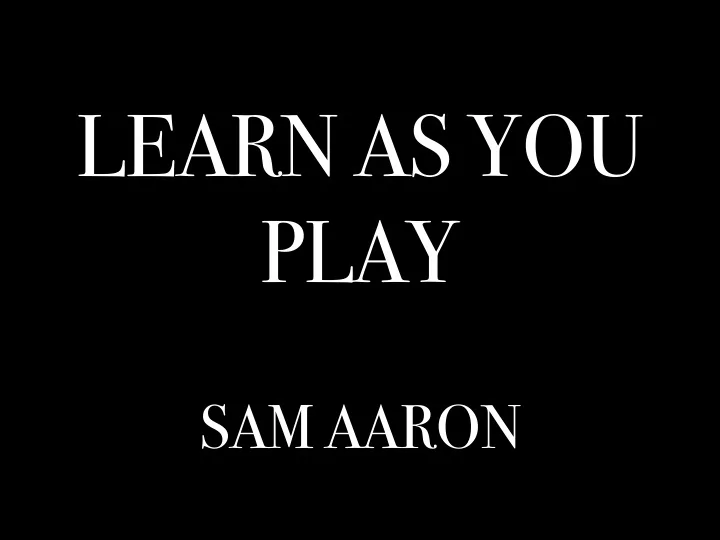

LEARN AS YOU PLAY SAM AARON
NOTES ON THE SYNTHESIS OF FORM CHRISTOPHER ALEXANDER
[Design is] "the process of inventing things which display new physical order, organisation, form, in response to function..." Christopher Alexander
λ rake spec (in /Users/sam/Development/monomer) ....................................... .........*............................. ....................................... ........*.............................. ......*................................ ....................................... ....................................... ........
"eyes".scan /the_darkness/ catch( :in_the_wind ) { ?a.round; "breath" \ or "a".slice /of_moon/ }
better watchout better !cry !pout lpr why santa claus <north pole > town cat /etc/passwd > list ncheck list ncheck list cat list | grep naughty > nogiftlist cat list | grep nice > giftlist santa claus <north pole > town who | grep sleeping who | grep awake who | egrep ‘bad|good’ for (goodness sake) {be good} Sam Aaron - Aesthetic Programming in a Communicative age - May 2009
"Art is, in part, the practice of intense and disciplined noticing of details, of life, of how the world works and in that way at least it resembles science." Richard P . Gabriel Kevin J. Sullivan
What are we?
What are programmers?
Are we Scientists?
Scientists create knowledge are problem driven seek to understand and explain design experiments to test the theories prefer abstract knowledge rely on tacit knowledge
Are we Engineers?
Engineers create knowledge are problem driven seek to understand and explain design experiments to test the theories prefer contingent knowledge rely on tacit knowledge
Are we Artists?
Artists create knowledge, language, alternative reality are image or “piece” driven seek to understand and explain design devices (their pieces) to explore the world and the self prefer contingent knowledge rely on tacit knowledge
Scientists Engineers Artists create knowledge, language, create knowledge create knowledge alternative reality are problem driven are problem driven are image or “piece” driven seek to understand and explain seek to understand and explain seek to understand and explain design experiments to test the design experiments to test the design devices (their pieces) to theories theories explore the world and the self prefer abstract knowledge prefer contingent knowledge prefer contingent knowledge rely on tacit knowledge rely on tacit knowledge rely on tacit knowledge
engineering art science
How do we create knowledge?
a → b
Deduction a → b
Induction a → b
Abduction a → b
Guessing!?
Conceptual and Experimental
Pica Pica Concept Experiment mathematician craftsperson Science Einstein Darwin waterfall engineer Warhol 1970s Hacker Art agile Picasso live coders
“This is the full process of art— exploration , discovery , and then verification or understanding —and it’s also the full process of science. Naturally, it’s not a linear process but one with cycles of explore-discover-understand within any of its steps.” Richard P . Gabriel Kevin J. Sullivan
“If we attempt to map the world of a story before we explore it, we are likely either to (a) prematurely limit our exploration, so as to reduce the amount of material we need to consider, or (b) explore at length but, recognising the impossibility of taking note of everything, and having no sound basis for choosing what to include, arbitrarily omit entire realms of information. The opportunities are overwhelming.” Peter Turchi
Play motivation Value learn expertise confidence
“Play appears to be the bonobos’ key to problem- solving, creativity, forming connections, and avoiding conflict.” Isabel Behncke
We need to cultivate tacit knowledge practice & discipline and being able to notice deeply as artists do
Thank you @samaaron http://sam.aaron.name
Recommend
More recommend